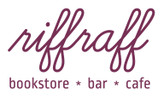Our book club meets monthly and is open to anyone who'd like to join. There is no need to reserve a spot or even buy the book from us, simply show up prepared to discuss the book on the night of the meeting.
Current meeting schedule: BOTH BOOK CLUBS WILL BE MEETING ON WEDNESDAY, APRIL 30TH, AT 7PM!
FICTION BOOK CLUB
On The Clock by Claire Baglin
[buy it here]
Claire Baglin's On the Clock packs a family saga, a penetrating picture of social inequality, and a coming-of-age story into a compact tale told in two alternating strands. The first follows the 20-year-old narrator's summer job at a fast food franchise and the other shows us moments from her childhood with her family, with a particular focus on her hapless, infuriating, good-hearted father, a low-paid but devoted electrician in a factory with an upside-down smile. These two skeins sketch out in swift turns two stories of underappreciated work: one covering several decades, the other a summer; one constituting a sort of life, the other a stopgap on the way to something different (the narrator is a college student). With a keen eye for eloquent details and sharp ear for workplace jargon, her dry humor, and a crisp compelling style, Baglin's depiction of their lives is particularly rich, at once affectionate and alienated. Working the alternating strands in a way reminiscent of Georges Perec's W or the The Memory of Childhood, the past is remarkably vivid in On the Clock: her childhood memories of their bleak small town and of summer vacations spent at campgrounds by the sea in Brittany. And the present blazes in scenes of the young woman's current fast-food trial: the awful boss, the nasty manager, and all the tedium and horror of dead-end work:
Slowly the oven door opens and a nursery-school tune announces that the salad rolls can come out [and] I'm mired in the heart of pointlessness. I stick a straw into the whipped cream but don't take off the end of the paper wrapper so they'll know it hasn't been used, I'm conscientious.
NON-FICTION BOOK CLUB
American Bulk by Emily Mester
[buy it here]
In a series of deeply personal essays, Mester explores how the things we buy, eat, amass, and discard become an intimate part of our lives. We guiltily watch Amazon boxes pile up on the porch, wade through endless reviews to find the perfect product, and crave the comforting indulgence of a chain restaurant. With humor and sharp intellect, Mester reflects on the joys and anxieties of Costco trips, how a seasonal stint at Ulta Beauty taught her the insidious art of the sale, and what it means to get "mall sad." In a nuanced examination of diet culture and fatness, Mester recounts her teenage summer at fat camp and the unexpected liberation she finds there. Finally, she ventures to Storm Lake, Iowa, to reckon with her grandmother's abandoned hoard, excavating the dysfunction that lies at the heart of her family's obsession with stuff. American Bulk introduces readers to a striking new literary talent from the American heartland, one who dares to ask us to regard consumption not with guilt but with grace and empathy.
MAY BOOK CLUBS! MEETING WEDNESDAY, MAY 28TH, 7PM!
FICTION BOOK CLUB: THE STEPDAUGHTER, by Caroline Blackwood
[buy it here]
A wicked stepmother finds her ideal prey in Carlone Blackwood's "quite brilliant" (The Times) debut.
A lavish Upper West Side apartment is the site of a familial cold war about to enter a phase of dangerous escalation.
J is a lonely woman without even the luxury of being alone. Her husband has fled to Paris with his latest flame, but he's left J not only with their own four-year-old daughter, Sally Ann, but with the sulky cake-mix addicted, thirteen-year-old Renata, a leftover from his previous marriage. The presence of a pert au pair, Monique, serves only to make J feel more isolated and self-conscious. What she'd like is someone to blame.
Writing letters in her head to imaginary friends, J delights in dwelling on the hapless Renata, who "invites a kind of cruelty." This is an invitation J fully intends to take up--and like so many stepmothers before her, she will find that wickedness, once indulged, is a difficult habit to kick. A mordant black splinter of a book, Caroline Blackwood's first novel stands as proof positive of her eternal mastery--and mockery--of the darkest depths of human feeling.
--
NON-FICTION BOOK CLUB: ON GIVING UP, by Adam Phillips
[buy it here]
From acclaimed psychoanalyst Adam Phillips, a meditation on what we must give up to feel more alive.
To give up or not to give up?
The question can feel inescapable but the answer is never simple.
Giving up our supposed vices is one thing; giving up on life itself is quite another. One form of self-sacrifice feels positive, something to admire and aspire to, while the other is profoundly unsettling, if not actively undesirable.
There are always, it turns out, both good and bad sacrifices, but it is not always clear beforehand which is which. We give something up because we believe we can no longer go on as we are. In this sense, giving up is a critical moment--an attempt to make a different future.
In On Giving Up, the acclaimed psychoanalyst Adam Phillips illuminates both the gaps and the connections between the many ways of giving up and helps us to address the central question: What must we give up in order to feel more alive?
